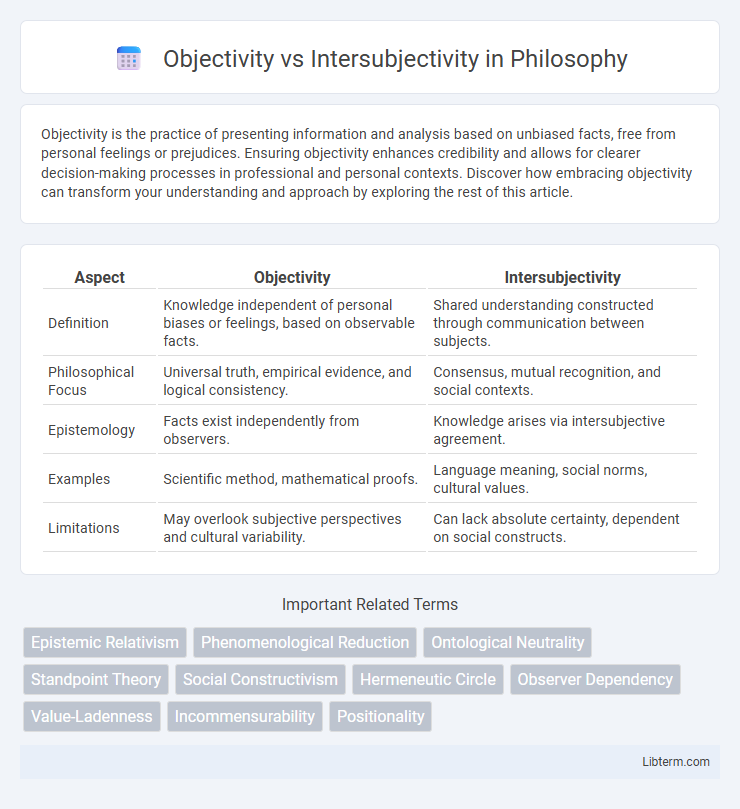Objectivity is the practice of presenting information and analysis based on unbiased facts, free from personal feelings or prejudices. Ensuring objectivity enhances credibility and allows for clearer decision-making processes in professional and personal contexts. Discover how embracing objectivity can transform your understanding and approach by exploring the rest of this article.
Table of Comparison
| Aspect | Objectivity | Intersubjectivity |
|---|---|---|
| Definition | Knowledge independent of personal biases or feelings, based on observable facts. | Shared understanding constructed through communication between subjects. |
| Philosophical Focus | Universal truth, empirical evidence, and logical consistency. | Consensus, mutual recognition, and social contexts. |
| Epistemology | Facts exist independently from observers. | Knowledge arises via intersubjective agreement. |
| Examples | Scientific method, mathematical proofs. | Language meaning, social norms, cultural values. |
| Limitations | May overlook subjective perspectives and cultural variability. | Can lack absolute certainty, dependent on social constructs. |
Defining Objectivity and Intersubjectivity
Objectivity refers to the practice of perceiving and describing phenomena without influence from personal feelings or biases, relying on observable and measurable facts. Intersubjectivity involves the shared understanding and agreement among multiple subjects, emphasizing collective validation and mutual recognition of experiences. Both concepts are essential in epistemology and social sciences for ensuring knowledge claims are credible and socially validated.
Historical Origins of the Debate
The debate between objectivity and intersubjectivity originated in early epistemological discussions during the Enlightenment, where philosophers like Immanuel Kant challenged purely objective knowledge by emphasizing the role of human perception. The 20th century saw further development through phenomenology and existentialism, with thinkers such as Edmund Husserl and Jean-Paul Sartre highlighting intersubjective experiences as fundamental to understanding reality. This historical trajectory reveals a shift from a singular, objective reality toward recognizing shared subjective interpretations as crucial for knowledge formation.
Philosophical Foundations: Key Theories
Objectivity in philosophy emphasizes the pursuit of knowledge independent of individual biases, grounded in empirical evidence and logical consistency as seen in positivism and scientific realism. Intersubjectivity highlights shared understanding through communication and social interaction, foundational to phenomenology and hermeneutics where meaning is co-constructed among subjects. Key theories by Husserl advocate for a universal human experience, while Habermas explores communicative rationality that bridges objective facts with intersubjective validation.
Objectivity in Science and Knowledge
Objectivity in science ensures that observations and results are independent of individual biases, relying on empirical evidence and reproducibility to establish facts. Scientific methodologies emphasize standardized measurements and peer review processes to minimize subjective influence and promote reliable knowledge. This commitment to objectivity enables the construction of universally valid theories that withstand individual perspectives and cultural differences.
Intersubjectivity in Social Contexts
Intersubjectivity in social contexts refers to the shared understanding and mutual recognition of meanings between individuals, enabling effective communication and cooperation. It emphasizes the collaborative construction of reality, where social actors negotiate and align their perspectives within cultural norms and social frameworks. This process contrasts with objectivity by highlighting the role of interpersonal relations and consensus in shaping knowledge and experience.
Comparing Epistemological Approaches
Objectivity emphasizes knowledge derived from observable, measurable facts independent of individual biases, prioritizing empirical verification and reproducibility. Intersubjectivity, by contrast, values shared understanding constructed through social interactions and consensus among observers, highlighting the interpretative nature of knowledge. Epistemologically, objectivity aligns with positivist paradigms, while intersubjectivity supports constructivist frameworks acknowledging the role of context and collective meaning-making.
Challenges to Pure Objectivity
Challenges to pure objectivity arise from the inherent influence of personal biases, cultural contexts, and subjective experiences on perception and interpretation. Scientific observations and data collection are often framed within human perspectives, limiting complete detachment from intersubjective understandings shared among observers. The dynamic interplay between individual cognition and collective consensus underscores the difficulty in achieving absolute objectivity across disciplines like philosophy, social sciences, and empirical research.
The Role of Language in Intersubjectivity
Language functions as the primary medium through which intersubjectivity is established, allowing individuals to share meanings, intentions, and experiences. Unlike objectivity, which emphasizes detached and verifiable facts, intersubjectivity relies on linguistic negotiation and mutual understanding to construct shared realities. Semantic structures within language enable communication to bridge subjective perspectives, facilitating consensus and collaborative meaning-making in social interactions.
Practical Implications in Research and Ethics
Objectivity in research emphasizes unbiased data collection and analysis, ensuring replicable and generalizable results, while intersubjectivity highlights shared understanding and consensus among researchers to interpret findings within contextual frameworks. Practical implications include balancing methodological rigor with ethical considerations, such as respecting participant perspectives and cultural differences during data interpretation to avoid misrepresentation. Ethical research demands transparency in how subjective interpretations influence conclusions, promoting accountability and trustworthiness in knowledge production.
Bridging Objectivity and Intersubjectivity
Bridging objectivity and intersubjectivity involves integrating empirical data with shared human experiences to create a comprehensive understanding of reality. This approach leverages objective measurements while acknowledging the influence of cultural, social, and personal perspectives in shaping knowledge. Combining these dimensions enhances the validity and applicability of conclusions across diverse contexts.
Objectivity Infographic

 libterm.com
libterm.com